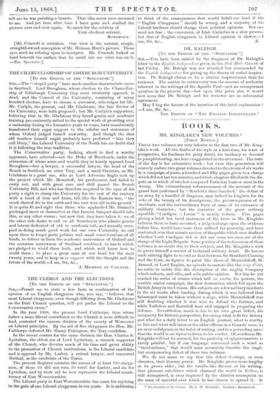THE CHANCELLORSHIP OF EDINBURGH UNIVERSITY.
[To THE EDITOR OF THE "SPECTATOR."] SIR,—The "stupid party" have made another characteristic move in Scotland. Lord Brougham, whose election to the Chancellor- ship of Edinburgh University they most virulently opposed, is dead, and the Council of the University, consisting of many hundred electors, have to choose a successor, who reigns for life. Mr. Carlyle, the present, and Mr. Gladstone, the late Rector of the University, were both proposed ; but Mr. Carlyle's supporters, believing that in Mr. Gladstone they found genius and academic training pre-eminently suited to the special work of presiding over a university during the formative years to come, have unanimously transferred their eager support to the scholar and statesman of whom Oxford judged herself unworthy. And though the dear old heathen himself might probably have preferred "him they call Dizzy," the Liberal University of the North has no doubt that it is following the true tradition.
The Conservative party, looking about to find a worthy opponent, have selected—not the Duke of Buccleuch, under the attraction of whose acres and wealth they so keenly opposed Lord Brougham—but a lawyer, a successful lawyer, the head of the Bench in Scotland, an utter Tory, and a small Oxonian, as Mr. Gladstone is a great one, who as Lord Advocate Inglis took up the project which Mr. Moncrieff, his predecessor, had failed to carry out, and with great care and skill passed the Scotch University Bill, and who has therefore acquired in the eyes of his party a right to clamp the University for the rest of the century with a band of iron and brass, till, like the Eastern tree, "the stock thereof die in the earth and the root wax old in the ground." It is quite fit and right that those who applauded Mr. Disraeli's prolonged sneer at themselves at that famous banquet should take this, or any other course ; but now that they have taken it, we of the other side desire to call on all Scotchmen who admire genius and labour dedicated of old to academic toil, and recently occu- pied in doing much good work for our own University, we call upon them to forget party politics and small considerations of all kinds, to deliver us from the academic narrowness of Oxford and the sectarian narrowness of Scotland combined, in hands which are pledged to wield them both, and which well know how to wield them ; to place a great man at our head for the next twenty years, and to keep us en rapport with the thought and the future of the world.—I am, Sir, &c., A MEMBER OF COUNCIL.






























 Previous page
Previous page